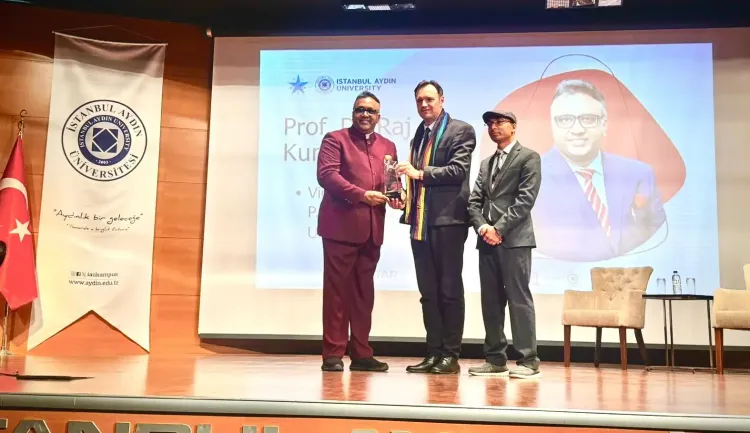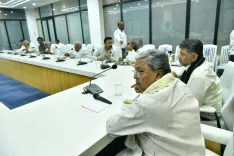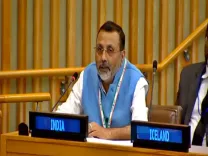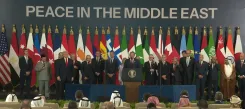How Did JGU Earn the 2025 Global Education for Peace Award?

Synopsis
Key Takeaways
- JGU received the 2025 Global Education for Peace Award for its contributions to peace through education.
- The STAR Global Conference highlighted the importance of integrating local knowledge with global perspectives.
- JGU's leadership emphasizes ethical leadership and community engagement.
- Next year's STAR Global Conference will be hosted by JGU in December 2026.
- The award underscores the role of universities in fostering intercultural understanding.
Istanbul, Oct 13 (NationPress) O.P. Jindal Global University was awarded the esteemed 2025 Global Education for Peace Award by the Society of Transnational Academic Researchers (STAR) during their STAR Global Conference 2025 in İstanbul, Turkiye, recognizing its pivotal role in promoting peace through higher education.
The Society of Transnational Academic Researchers (STAR Scholars Network) serves as an international platform dedicated to empowering scholars as agents of change to foster a humane world. By enhancing global social mobility through innovative research and progressive advocacy, STAR nurtures communities that support scholars across borders.
During the award acceptance speech, Dr (C.) Raj Kumar, the Founding Vice Chancellor of JGU, remarked, “In Istanbul, a historical crossroads of Asia and Europe, I envisioned a new global compact for higher education that emphasizes local knowledge and community wisdom. International declarations alone cannot ensure a sustainable future; it must be cultivated through the lived experiences of individuals, particularly farmers, artisans, women, and youth. Universities should act as hubs where local realities converge with global research, creating an ecosystem of hope and knowledge. The Global South must move beyond merely receiving information and values; it needs to generate these based on ethics, inclusion, and social justice. Only when we listen to the earth and the voices of communities can universities become truly sustainable. We need to redefine excellence to prioritize impact over prestige, collaboration over competition, and purpose over profit. The future university will be inclusive, innovative, and in harmony with existence.”
The STAR Global Conference gathered scholars, practitioners, and leaders from various disciplines worldwide. The theme, “Advancing Local Knowledge for a Brighter and Sustainable Future,” aimed to elevate the role of universities in recognizing, rewarding, and sustaining diverse knowledge ecosystems.
The STAR Network unites to indicate a hopeful future where local knowledge ecologies are strengthened and made more sustainable while contributing to global knowledge bases. Next year, JGU will proudly host the 2026 STAR Global Conference in December 2026.
Professor (Dr) Uttam Gaulee, President of the STAR Scholars Network, stated, “Congratulations to O.P. Jindal Global University for achieving the prestigious 2025 Global Education for Peace Award. Despite being a relatively young institution, JGU’s remarkable ascent and recognition on the global stage is truly inspiring, serving as a model for universities worldwide. The leadership at JGU has shown steadfast dedication to promoting peace through education, creating a profound impact that transcends borders. We are excited to announce that JGU will host the 2026 STAR Global Conference in December 2026. We look forward to working together with their visionary team to advance our shared mission of empowering scholars and fostering a more humane world. JGU’s commitment to integrating local knowledge with global perspectives aligns perfectly with the goals of the STAR Scholars Network. Together, we can continue building ecosystems of hope, knowledge, and sustainable development. Congratulations once more to JGU and its leadership for this well-deserved accolade!”
The Global Education for Peace Award honors and recognizes higher education institutions (HEIs) worldwide that significantly contribute to promoting global peace through education. It celebrates institutions that incorporate global perspectives into their curriculum, foster a sense of global citizenship among students, and cultivate a culture of dialogue and empathy that transcends borders.
This award underscores the role of universities as bastions of intellectual freedom, intercultural understanding, and ethical leadership during a time of increasing polarization and conflict.
Recognizing the importance of the Conference, Professor (Dr) C. Raj Kumar said, “The STAR Global Conference demonstrates that advancing local knowledge is the foundation of a robust and sustainable future. Our universities must bridge the gap between global science and local wisdom, and connect the classroom to the broader community. We need to foster epistemic justice where indigenous, rural, and community-based knowledge systems are valued equally with modern science. The Global South has the potential to lead in redefining sustainability through resilience, creativity, and human solidarity. As I have previously stated, knowledge without context becomes mere abstraction, but knowledge rooted in community is transformative. We face a moral and intellectual challenge to reimagine universities as the conscience of society. Spanning from India to Turkiye, and from Africa to Latin America, our shared mission is to establish universities that serve humanity, heal the planet, and make knowledge a powerful force for good.”
The Conference, which emphasized justice and inclusion, gender, identity, culture, educational challenges, transformative teaching, and knowledge innovation, centered around several key principles. It highlighted that many universities worldwide, in their pursuit of numeric rankings, have inadvertently distanced themselves from the diverse and complex knowledge ecosystems that sustain their local societies and nations.
The conference advocated for a broader, more inclusive understanding of knowledge that encompasses diverse methods of knowledge creation, sharing, and application on local and global scales.
The award acknowledges JGU’s curriculum, which is grounded in ethical leadership, critical thinking, and interdisciplinary learning; over 550 international collaborations that facilitate global dialogue and cooperation; its commitment to community engagement and social responsibility; and initiatives aimed at preparing students to become informed, responsible, and compassionate global citizens.
These accomplishments reflect JGU’s vision of transforming education into a force for peace, justice, and sustainability in society. They also highlight the university’s role as one of India’s most globally connected institutions, advancing cross-cultural dialogue and preparing future leaders to tackle humanity’s shared challenges.









